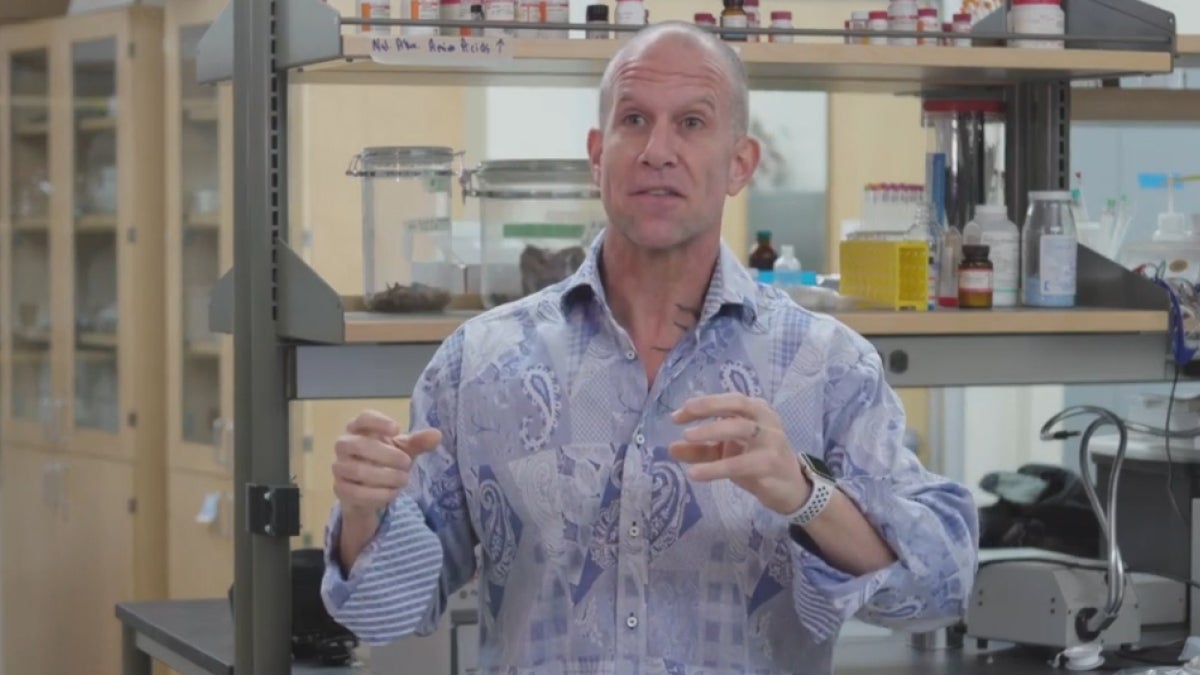Next-generation laboratory course developed for online chemistry students

School of Molecular Sciences Professor Jeff Yarger is developing an updated version of the CHM 343 laboratory course taken by ASU Online students.
Contemporary trends in commercial chemistry laboratory techniques are moving toward incorporation of more automation and remote access to scientific instrumentation and analysis.
Modern analytic scientific techniques increase efficiency and accuracy, and decrease costs by using cameras, autosamplers and other aspects of automation in concert with cloud connectivity to make measurements on samples and process data.
NMR (nuclear magnetic resonance) spectroscopy, for example, has already embraced this approach, and routine NMR analysis at Arizona State University is now fully automated.
Jeff Yarger, a professor in ASU's School of Molecular Sciences who oversees the NMR research facility, believes that teaching methods should prepare students with skills that will benefit them in the workforce after they graduate.
Students need to be prepared for the new automated world of instrumentation in chemistry and biochemistry, yet there are essentially no courses in the current chemistry or biochemistry curriculum at any academic institution that teaches these skills. This is the goal of a major update to the CHM 343 Physical Chemistry Laboratory course taught to ASU Online students.
“There is a rapid increase in automation of scientific and medical instruments in industry and the private sector,” Yarger said. “It is also becoming more common in academia, and to not see that future for the lab sciences would be short-sighted. Getting our students ready for that future is critical.”
Yarger is developing an updated version of the CHM 343 laboratory course that is taken by ASU Online students built around remote access and control of instrumentation.
The online class size is smaller than the on-campus course, which is helpful in this development stage, since there is no existing laboratory courses of this type that can provide guidance on how to make it all work. The advantage of this approach for online students is obvious, however, the longer-term goal is to bring this new laboratory course to all chemistry and biochemistry students, online and on campus.
Online students in Yarger’s course are taught to run a variety of analytical instruments remotely, and then view and interpret the results through internet-based interfaces. In one experiment, students use a remote-controlled acoustic interferometer equipped with a camera and microphone system to view and listen to the instrument as if they were in the same room with it. Data analysis is performed in real time using readily available soundwave analysis software.
Students gain experience working with state-of-the-art instrumentation and contemporary data analysis. In some experiments, Yarger has also had students submit their own samples for analysis, giving them additional ownership of the experience. Yarger has had to tackle some challenges along the way, specifically that different instruments have different interfaces, which represents an additional cognitive load for students who have to learn each interface.
“I would like to see the computer interface become more generalized for instruments, which would make it easier for students and researchers alike,” Yarger said. “A real benefit of this approach is that it allows students to focus more on the scientific analysis and less on the instrument, which puts them in the position to make new discoveries that benefit humanity.”
Yarger’s experience with this course development lays the groundwork for building a suite of remote-controlled instrumentation for both teaching and research. The future of molecular-based research will increasingly rely on robotics and remote analysis of samples and of data. Yarger’s own graduate students currently perform significant parts of their research remotely through the use of live video feeds and robotics.
“Chemistry is an inherently experimental subject that has required (the school) to come up with novel ways of providing authentic laboratory experiences to online students, and Jeff’s new course represents the next step in innovation in hands-on chemistry teaching and learning” said Ian Gould, associate dean for online learning and innovation in the College of Liberal Arts and Sciences.
“Jeff is positioning (the school) and ASU as a leader in giving both online and on-campus students the experimental training they will need to be competitive in the job marketplace.”
More Science and technology

ASU-led space telescope is ready to fly
The Star Planet Activity Research CubeSat, or SPARCS, a small space telescope that will monitor the flares and sunspot activity…

ASU at the heart of the state's revitalized microelectronics industry
A stronger local economy, more reliable technology, and a future where our computers and devices do the impossible: that’s the…

Breakthrough copper alloy achieves unprecedented high-temperature performance
A team of researchers from Arizona State University, the U.S. Army Research Laboratory, Lehigh University and Louisiana State…

